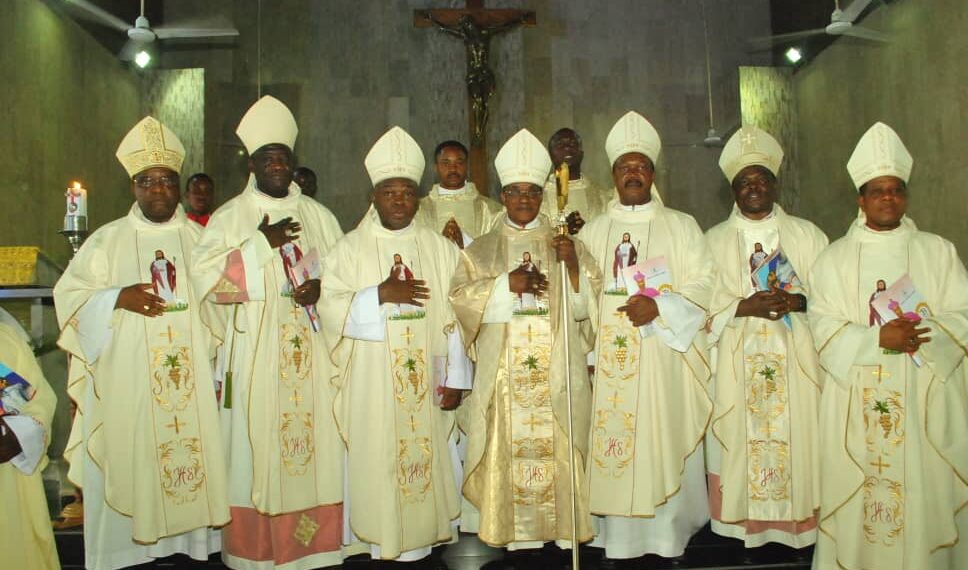Catholic Bishops in Nigeria have told President Bola Tinubu that insecurity and economic hardship have now worsened in the country.
Nigerians, in recent times, have been battling increased economic hardship, following the worsening inflation and continuous Naira slip in the market.
Similarly, the country has continued to face security challenges, with frequent attacks by armed persons across various regions of the country.
Contents
‘Worse insecurity, economic hardship ever’
The Catholic bishops said despite huge budgetary allocations and monthly security votes in Nigeria, the federal government has failed to address growing insecurity and economic hardship in the country.
The bishops spoke through a speech delivered by their President, Lucius Ugorji, at the formal opening of the 2024 First Plenary Assembly of the Catholic Bishops Conference of Nigeria (CBCN) on Sunday, at the Catholic Secretariat of Nigeria, Abuja.
“If we cast a cursory glance at the present state of our nation, we are inclined to conclude that this seems to be the worst of times for our country in the areas of security and the economy,” Mr Ugorji said.
![President Bola Tinubu [PHOTO: PRESIDENCY]](https://media.premiumtimesng.com/wp-content/files/2023/11/354466490_269109535694397_677328853636727537_n.jpg)
Insecurity
The CBCN president said insecurity has permeated the entire Nigeria, with killings and other crimes occurring in different parts of the country.
“Recently, there has been an upsurge in kidnapping for ransom and increasing incidents of senseless bloodshed across the nation.
“Many communities across the nation have been taken over completely by criminals. Families have lost their ancestral lands to armed invaders and land-grabbers,” Mr Ugorji said.
He noted that the security situation has “paralysed” the social and economic lives of Nigerians.
“Schools have been shut down, and children can no longer continue their education.”
‘Grinding poverty, and untold hardship’
Nigeria’s economic situation worsened on 29 May 2023 after Mr Tinubu announced the removal of oil subsidies in the country.
Mr Ugorji said President Tinubu’s economic reforms were responsible for increased suffering and hardships in the country.
“High spiralling inflation has made it difficult for the average Nigerian to access basic commodities, including food items and medication.
“As a result of the government’s reform agenda, millions of Nigerians have been reduced to a life of grinding poverty, wanton suffering, and untold hardship as never before in our national history,” he lamented.
The bishop said it is strange that Mr Tinubu asked Nigerians to make sacrifices for the good of the country, but at the same time public officials under his government continue to spend huge sums on luxurious lifestyles.
“As the government demands additional sacrifice from the struggling masses, one would expect to see a drastic cut in the cost of running the government at all levels.
“On the contrary, it is worrisome to watch top government functionaries living by the sweat, toil and tears of the poor. They continue spending huge public funds on ostentatious and luxurious lifestyles and seem incapable of feeling compassion at the outcry of the poor,” he stated.
Mr Ugorji added that corruption among public officials under Mr Tinubu administration has also gone “beyond scale and measures.”
“Every day, outrageous and spine-chilling stories are told in the media about different public servants who have stolen staggering amounts of money from public coffers in a country where millions of citizens live in deep and debilitating poverty,” the bishop said, adding that the situation has been worsened by high unemployment rate.
‘Why subsidy removal is a fairy tale’
Mr Ugorji said Mr Tinubu, in removing the oil subsidy, had assured Nigerians that he would save a lot of money to be injected into other national development sectors. But he said the president has failed to do so.
“Rather than give evidence of money so far saved from the withdrawal of subsidies for which Nigerians are being afflicted with untold hardship, all we hear is the government’s accumulation of more and more foreign debts to balance its budgetary deficit, thereby mortgaging the future of our nation and generations yet unborn,” he said.
“This has led many Nigerians to conclude that all the extensive talks on ‘fuel subsidies’ may be mere fairy tales.”





































![FILE PHOTO: Catholic Bishops of Nigeria [PHOTO: Warri Diocese]](https://media.premiumtimesng.com/wp-content/files/2024/02/IMG-20220203-WA0051-e1708365561475-968x570.jpg)













